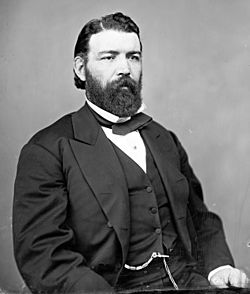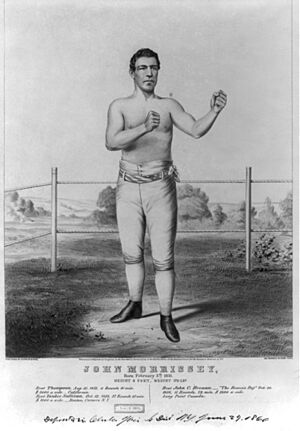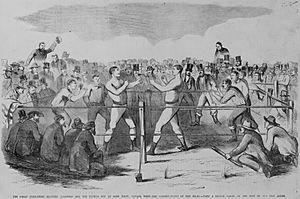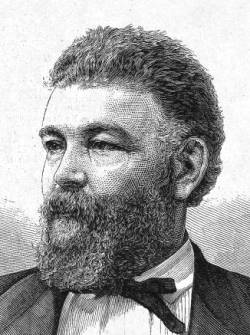John Morrissey facts for kids
Quick facts for kids
John Morrissey
|
|
|---|---|

John Morrissey, during his time in politics, circa 1870s
|
|
| Member of the U.S. House of Representatives from New York's 5th district |
|
| In office March 4, 1867 – March 4, 1871 |
|
| Preceded by | Nelson Taylor |
| Succeeded by | William R. Roberts |
| Member of the New York Senate from the 4th district |
|
| In office January 1, 1878 – May 1, 1878 |
|
| Preceded by | James W. Gerard |
| Succeeded by | Thomas Murphy |
| Member of the New York Senate from the 4th district |
|
| In office January 1, 1876 – December 31, 1877 |
|
| Preceded by | John Fox |
| Succeeded by | Edward Hogan |
| Personal details | |
| Born | February 12, 1831 Templemore, County Tipperary, Ireland |
| Died | May 1, 1878 (aged 47) Saratoga Springs, New York, U.S. |
| Political party | Democratic |
| Spouse | Susie Smith |
| Children | John Morrissey, Jr |
| Occupation | Boxer, Politician |
John Morrissey (born February 12, 1831 – died May 1, 1878), also known as Old Smoke, was an Irish American politician and a champion boxer.
He was born in Ireland in 1831. His family moved to New York State when he was a young child. In the early 1850s, he traveled to San Francisco during the California Gold Rush. There, he became a well-known bare-knuckle boxer. When he returned to New York, he challenged and defeated "Yankee Sullivan," who was then the American boxing champion.
Morrissey became a successful businessman, owning gambling houses in New York City. He also became a powerful politician. He served as a U.S. Congressman for New York from 1867 to 1871. Later, he became a Democratic State Senator for New York from 1876 to 1878.
Contents
Early Life and His Nickname
Morrissey was born in Templemore, County Tipperary, Ireland on February 12, 1831. Around 1833, his parents moved to the United States. They settled near Troy, New York. John's father, Timothy, worked hard to support his large family, which included seven daughters and his only son, John.
John had little formal education. He started working at age 12 in a wall-paper factory. Later, he worked at an iron-works and a stove foundry. By 1848, Morrissey was involved in group rivalries in Troy. He became a leader of one group and often faced off against rivals.
In 1848, Morrissey moved to New York City. He worked on a steamer boat that traveled between Albany and New York. Around 1849, he married Sarah Smith, the daughter of a ship's captain. It was in New York that he got his famous nickname, "Old Smoke." This name came from a very tough fight. During the fight, Morrissey was said to have kept fighting even when smoke was rising from his back! This showed how incredibly tough he was.
In 1851, Morrissey sailed to San Francisco. He hoped to find fortune during the California Gold Rush. While he didn't strike gold, Morrissey became a well-known gambler. He earned a lot of money from winning games.
Becoming a Boxing Champion
Morrissey first entered a professional prizefighting ring in California. On August 31, 1852, he defeated George Thompson in the 11th round. He won $5,000 from this fight. This success encouraged him to return to New York. He wanted to fight the American Champion, Yankee Sullivan.
Morrissey returned to New York and challenged Sullivan many times. Finally, Sullivan agreed to fight. Boxing was a tough sport and often not allowed in many places during the 1850s. The first boxing rules, called the London Prize Ring Rules, were created in 1743. These rules helped protect fighters. For example, if a fighter fell and couldn't continue after 30 seconds, the fight ended. Hitting a downed fighter was not allowed. Fights usually lasted many rounds. A round continued until one fighter touched the ground or fell.
Morrissey and Sullivan signed an agreement for their fight on September 1, 1853. The winner would get $1,000. The fight would follow the new London Prize Ring Rules. Morrissey began training two days later. The fight happened on October 12, 1853, in Boston Corners. This place was chosen because it was outside the reach of authorities.
Over 3,000 people watched the fight in a field. Sullivan seemed to be winning for most of the fight. But Morrissey kept fighting hard. In the 37th round, a struggle near the ropes led to a big commotion. The referee decided that Morrissey had won. Some reports said it was because Sullivan made an unfair hit. The fight lasted 55 minutes.
Morrissey did face legal consequences for the fight. He had to pay a fine of $1,200.
Morrissey's Last Fight
After his fight with Sullivan, Morrissey seemed to retire from boxing. He returned to Troy, New York. However, another fighter from Troy, John C. Heenan, became famous in New York in 1857. Heenan was known as a very strong fighter.
In July 1858, a prizefight was set up between Morrissey and Heenan. It was planned for October 20, 1858, in Canada, on Long Point, Ontario. Before the fight, Heenan had a leg injury that made his training difficult. In the fight, Heenan started strong but then got tired. By the 11th and final round, Heenan could not defend himself. Morrissey landed a knockout punch, keeping his championship title.
Morrissey officially retired from boxing in 1859. Heenan then claimed the title. Even though Morrissey stopped fighting, he remained interested in boxing. In 1860, he traveled to England to watch a fight between Heenan and the English champion Tom Sayers. Morrissey even bet on Sayers to win and gave him "valuable advice" during his training.
Business Ventures
After retiring from boxing, Morrissey focused on his gambling businesses. He was said to own parts of 16 casinos at one point. In 1860, it was thought he was worth $200,000, which he had earned from his businesses.
In 1862, a police check on one of his gambling houses in New York showed it had made over $2,000 in just one month. Morrissey later opened a very successful gaming house in Saratoga Springs, New York. With the help of friends, he also created the Saratoga Race Course. The first races were held there in August 1863.
He also opened "The Club House," a casino in Saratoga. Many famous people visited this casino, including presidents like Chester A. Arthur, Rutherford B. Hayes, and Ulysses S. Grant. Other important guests included Cornelius Vanderbilt, John D. Rockefeller, and Mark Twain.
Political Career
In 1866, Morrissey ran for Congress. He had the support of a powerful political group called Tammany Hall. Even though his opponents talked about his past, he won. He served two terms as a Congressman from 1867 to 1871. As a Congressman, he always worked to help the Irish community. He was known for being very determined to reach his goals.
Morrissey eventually became unhappy with the corruption in Tammany Hall. He left the House of Representatives after his second term. He even spoke out against William Tweed, a powerful leader of Tammany Hall. Morrissey's actions helped send Tweed to prison.
Morrissey was then elected as an Anti-Tammany Democrat to the New York State Senate in 1875. He was re-elected in 1877.
Morrissey became sick with pneumonia and passed away on May 1, 1878, at the age of 47. The state closed all offices, and flags were lowered to half-mast. The entire State Senate attended his funeral in Troy on May 4, 1878. About 20,000 people lined the streets to show their respect. He was buried in St. Peter's Cemetery, near Troy.
Boxing Record
| 3 Wins, No Losses, No Draws | |||||||
| Result | Opponent | Date | Location | Duration | |||
| Win | George Thompson | 1852-08-31 | Mare Island, California | 11 rounds | |||
| Win | Yankee Sullivan | 1853-10-12 | Boston Corners, Massachusetts | 37 rounds | |||
| Win | John C. Heenan | 1858-10-20 | Long Point Island, Canada | 11 rounds | |||
Legacy
In 1996, John Morrissey was chosen for the International Boxing Hall of Fame. He was recognized in the "Pioneer" category for his early contributions to boxing.
Morrissey's story was also featured in a TV show called Paddy Whacked, The History of the Irish Mob. This show talked about him as an important figure in early Irish-American history. His rivalry with Bill Poole was shown in an episode of Blood Feuds.
There is a popular Irish song called "Morrissey and the Russian Sailor." It tells the story of a prizefighter named Johnny Morrissey. Many parts of the song connect to the real John Morrissey. For example, it mentions his birthplace in Templemore, County Tipperary. It also talks about him being a champion fighter and defeating "the Yankee." However, the main story in the song, about a fight against a Russian sailor, doesn't seem to be a real event.
See also
 In Spanish: John Morrissey para niños
In Spanish: John Morrissey para niños
 | Audre Lorde |
 | John Berry Meachum |
 | Ferdinand Lee Barnett |




